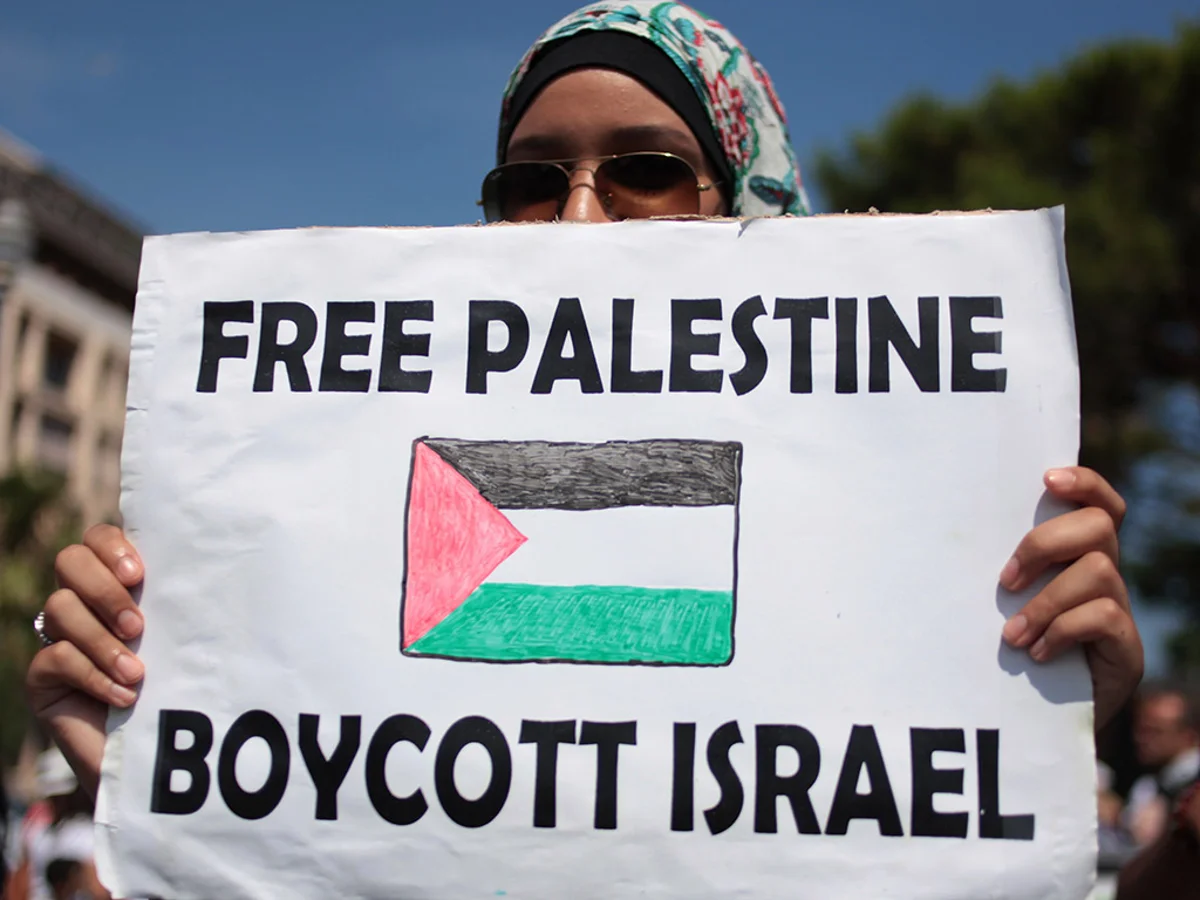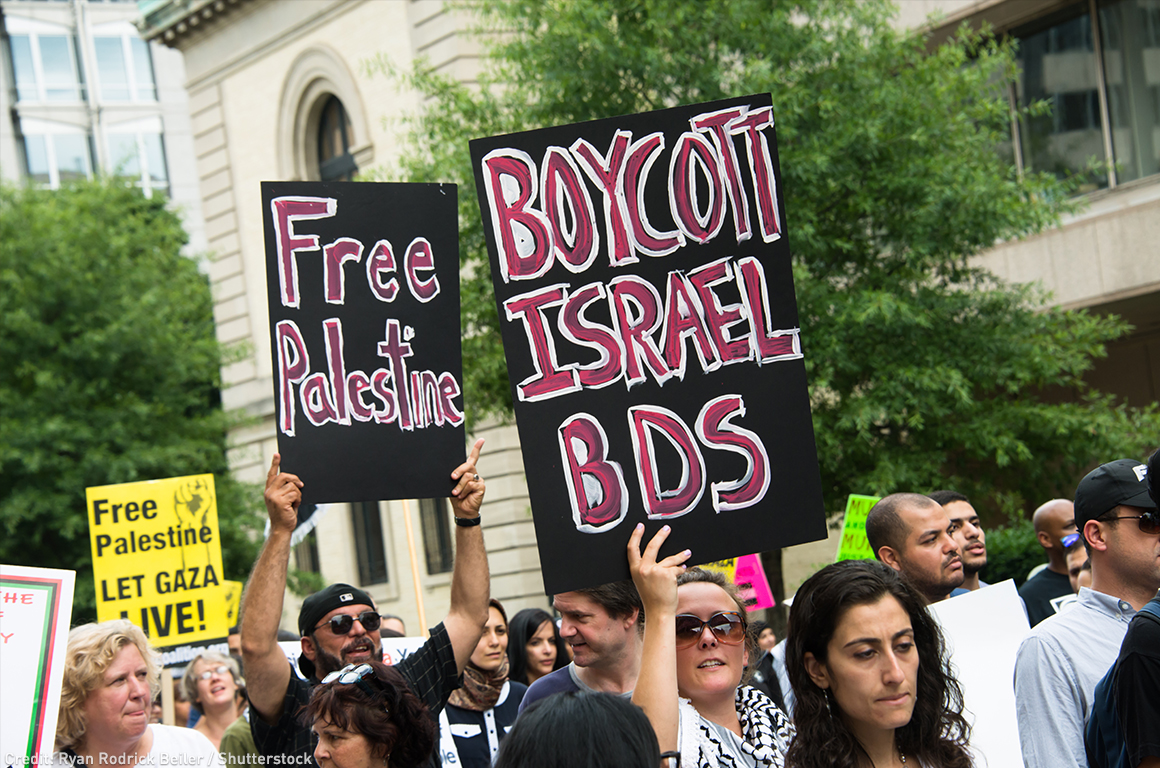This Is How a Bill Banning Public Bodies from Boycotting 'Israel' Sparked Controversy in the UK

Activists criticized the United Kingdom government for its decision to prevent city councils and public bodies from boycotting “Israel,” pointing out that this decision links the boycott with anti-Semitism.
The bill on economic activity of public bodies includes a ban on purchasing and investment decisions that depend on political or moral rejection of the behavior of a foreign country, such as the Boycott, Divestment and Sanctions (BDS) campaign.
The BDS bill was first set out in the Queen’s speech in 2022 after a commitment in the 2019 Tory general election manifesto.
In February last year, Tory MP Robert Jenrick tabled an amendment that would ban public sector employees from boycotting Israeli investments within their pension pots.
Human rights groups at the time called on the government to halt the legislation, stating that it would prevent public bodies from disentangling themselves from human rights abuses.
The moves appear to be an attempt to target the BDS movement, which seeks to pressure “Israel” into ending the illegal occupation of Palestinian territories.
Boycott Bill
Recently, the parliamentary process to introduce a law that would stop Britain’s public bodies from boycotting “Israel” began to alarm several human rights organizations.
The bill, which received its first reading in the British Parliament on June 19, 2023, would prevent Britain’s local councils and universities from adopting their own foreign policy by boycotting “Israel” or companies that trade with it.
A first reading is a formality where a bill is presented to the House of Commons, but no debate takes place. The second reading is already slated for July. There are a further five parliamentary stages before a bill can receive royal assent and become law.
The Telegraph reported that Michael Gove, the Cabinet minister responsible for local government, will introduce the legislation. Gove told the paper that the boycott of goods from “Israel” leads to appalling antisemitic rhetoric.
In this context, the Department for Levelling Up, Housing and Communities (DLUHC) explained in a statement that the boycott of public bodies against “Israel” has increased societal tensions and increased cases of anti-Semitism.
Minister Gove noted that these campaigns not only affect the UK’s foreign policy but also contribute to the spread of anti-Semitic rhetoric and the violation of human rights.
The bill sets out that the government can specify a country or territory for which the bill does not apply.
The bill extends the ban on boycotts beyond Israeli internationally-recognized borders to the Occupied Palestinian Territories (OPT) and the occupied Golan Heights.
If the anti-divestment bill passes into law, those who contravene it will be given a written notice, followed by potential fines if there is further failure to comply.
Higher education providers in England will be among the public bodies subject to the legislation enforceable by the Office for Students.
The UK’s intelligence and security services, as well as defense contractors, will be exempt.
There are also exceptions on the grounds of national security, international law breaches, cases of bribery, labor-related and competition law infringements, and environmental misconduct.
In a press release on June 19, the DLUHC said the bill would not change the UK’s approach to the Middle East peace process or the government’s position on Israeli settlements, which it said are illegal under international law.
The Jewish Leadership Council also backed the bill, accusing the BDS movement of importing conflicts into communities that risk increasing levels of anti-Semitism.
However, the Union of Jewish Students and several Jewish youth groups said they opposed the bill on the grounds that it violated civil rights, though they reiterated their opposition to BDS.
Other Jewish organizations, such as Na’amod and Diaspora Alliance, also rejected the bill.
Before 2019, Leicester, Swansea, and Gwynedd councils passed motions to boycott produce from illegal Israeli settlements in the West Bank until such time as “Israel” complies with international law and withdraws from the OPT.

Shield for ‘Israel’
In contrast, over 70 civil society organizations signed a letter warning that the anti-boycott bill represents an attack on freedom of expression.
“If passed, this law will stifle a wide range of campaigns concerned with the arms trade, climate justice, human rights, international law, and international solidarity with oppressed peoples struggling for justice,” they said.
In turn, the head of the Palestinian mission to the UK, Husam Zomlot, called on the UK government to withdraw the legislation, saying: “We are deeply concerned. This proposed bill is yet another sign that the UK is abdicating its historic responsibility for and direct role in creating the plight of the Palestinian people.
“By providing a cloak of impunity, this bill encourages more violations of international law, including the acquisition of territory by force, the moving of civilian settler populations to occupied territory, and home demolitions,” he said.
colonial settlement activity in occupied territory. For a country so closely identified with the rule of law this is a very disappointing situation 2/2
— Husam Zomlot (@hzomlot) June 19, 2023
On his part, former Labour Party leader Jeremy Corbyn stressed that the government’s anti-BDS bill is a disgraceful attack on our freedom to fight for human rights, pointing out that the BDS movement is necessary to ending the Israeli apartheid regime.
Boycott, divestment and sanctions helped end apartheid in South Africa.
— Jeremy Corbyn (@jeremycorbyn) June 19, 2023
They will be essential to ending the apartheid regime in Israel, too.
I will firmly oppose the government’s anti-BDS bill — a disgraceful attack on our freedom to fight for human rights, justice and peace.
However, the current Labour leader Keir Starmer has said his party does not support the BDS movement, in a break from his predecessor Jeremy Corbyn.
In turn, the Muslim Engagement and Development Organization (MEND) denounced the bill, which it described as retrograde and cruel and threatens freedom of expression and democratic principles.
It indicated that the bill aims to silence support for the BDS movement, which seeks to end the Israeli repressive policies against the Palestinians.
We MUST stand up for justice and human rights.
— MEND Community (@mendcommunity) June 20, 2023
Ultimately, MEND urges concerned citizens to WRITE TO THEIR LOCAL MPs and urge them to OPPOSE this legislation, which stifles free speech.
Please use our action alert to write to your MP: https://t.co/8JgWqAJEDS
Under the hashtag #RightToBoycott, the Palestine Solidarity Campaign (PSC) has renewed its call to sign a petition to reject the British government’s anti-boycott bill, and condemned the Tory government’s attempts to confuse boycotting “Israel” with anti-Semitism to protect it from accountability in light of the accelerating pace of Israeli attacks against the Palestinians.
The government’s new anti-boycott bill is part of a string of recent legislation – cutting back on the right to strike, and on the right to protest.
— PSC (@PSCupdates) June 21, 2023
The bill must be defeated.
Sign our petition opposing the bill: https://t.co/31CCG5CcU0 #RightToBoycott pic.twitter.com/u5Pj2C9C7k
On his part, Ben Jamal, Director of PSC, condemned the proposed law, noting that it is a major attack on freedom of expression, stating that boycotting is a legitimate, historically recognized tactic that has been the engine of great leaps forward for social and international justice.
He added, “If passed, this law will have a chilling effect on all campaigns for social and political change. This provides a shield for Israel to continue its colonization and human rights abuses.”
��The government has now tabled its anti-boycott bill, an attack on local democracy, freedom of expression and campaigns for human rights and climate justice.
— PSC (@PSCupdates) June 19, 2023
Read this thread and sign our petition to join 68 civil society groups in opposing this bill ➡️https://t.co/31CCG5CcU0 pic.twitter.com/r0tzruYk3i
The PSC and 48 other civil society organizations founded the Right to Boycott Coalition in April, aimed at defending the freedom to protest or boycott—core tenets in UK democracy.
It appears that the Tory government now aims to chisel away at these rights through the anti-BDS bill, ending the Human Rights Act, and other the Public Order Bill.
The latest bill isn’t the first time that the Tories have clamped down on boycotts. In 2016, PSC challenged similar proposed regulations that attempted to restrict Local Government Pensions Scheme (LGPS) from divesting from companies involved in or profiting from the Israeli Occupation’s human rights violations. The PSC won a landmark case against that effort in the Supreme Court in 2020.
Speaking to Middle East Eye, Ben Jamal criticized the UK government’s double standards over its treatment of “Israel,” which violates the rights of Palestinians, and Russia, which is waging war in Ukraine.
He also called out the British government’s double standard over its handling of “Israel”—despite supporting sanctions and divestment campaigns against Russia over its war in Ukraine.
“Nobody suggests that Ukrainians might be motivated by an inherent hatred of all Russian people when they call for action to hold Russia to account for its illegal occupation of their land,” said Jamal.
“This double standard is reinforced by an extraordinary section in the bill, a clause which outlines a special exception for Israel, granting it immunity from accountability not granted to any other state in the world,” he said.
Last year, the UK applied a wide range of sanctions and boycotts against Russian businesses and cultural programs following Moscow’s invasion of Ukraine.
The UK government has also enacted measures to ensure that British organizations and companies are not profiting from human rights abuses in Xinjiang, where the Chinese government is accused of detaining and abusing Uyghurs and other Muslim minorities.

Boycott ‘Israel’
BDS is a movement that seeks to pressure “Israel” to end the illegal occupation of Palestinian lands, similar to the boycott of the former apartheid regime in South Africa.
The BDS movement aims to end international support for Israeli systematic oppression of Palestinians and pressure “Israel” to comply with international law.
Called for by more than 170 Palestinian civil society groups in 2005, the movement has grown and spread worldwide.
The BDS movement describes itself as an inclusive, anti-racist human rights movement that is opposed on principle to all forms of discrimination, including anti-Semitism and Islamophobia.

In turn, political researcher Kamel Hawwash said in a statement to Al-Estiklal that the UK’s proposal to combat the boycott of “Israel” aims to protect its most prominent ally from any account for its ongoing crimes against the Palestinians.
He pointed out that “the pro-Israel lobby in the Tory has continued to press since 2019 for the passage of this bill, and the pressure has increased recently with the expected end of the Tory rule.”
Mr. Hawwash also noted that the minister charged with advancing this decision in parliament is Michael Gove, who is highly supportive of Zionism and “Israel.”
“The majority that the Tory obtained in the 2019 elections may have been able to pass this bill, but it will go through several stages before that, while human rights groups will work to discourage parliamentarians from passing it,” the researcher explained.
Sources
- Michael Gove to ban councils from boycotting Israeli goods
- UK public bodies banned from imposing their own boycotts against foreign countries
- UK Parliament Introduces Bill Outlawing BDS in Universities and Councils
- UK anti-divestment bill to single out boycott of Israel
- Boycott bill: Campaigners call out UK government for conflating BDS with antisemitism
- Right to Boycott












